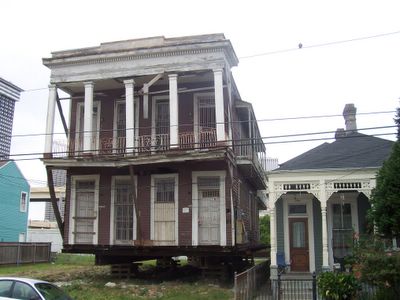This was my completely ignored respnose to the first article. Date: Wednesday, July 6, 2005
Dear Editors,
I am writing in response to the piece that Gordon Russell published in the Picayune yesterday titled “Get your house in order, city blight-fighter told”.
I find it commendable that the Picayune has finally decided to share this story with the public. I am however concerned that there was some vital information that was overshadowed by Mr.Russell’s concern for the mentioned parties. The aim of this letter is to help the Time Picayune reveal the truth within this story.
I implore you at the Times to investigate the history of the 1731 Clio property at the Safety and Permits office. You will surely find that Ms. Mizique has failed several inspections and a few of them were “over-ridden” by Chief Dwyer, in order for her to lay foundation.
One truth that was somehow denatured in this article is the actual role of Felicity Street Redevelopment. When this house was first placed, so inappropriately in its current place, citizens asked the neighborhood organization for their support in correcting this action at the BZA meeting. Felicity Street refused support. In fact, one employee of Felicity Street attended the meeting on her own accord. Louise Martin, head of Felicity Street Redevelopment was concerned that her employee’s presence would imply that the organization was concerned about this issue, and stated that she did not support her employee’s decision to attend the BZA meeting. She was very verbose with her refusal to assist the neighborhood in fighting this atrocity. Felicity Street Redevelopment and Louise Martin, knew about the plans to move and place this house at least one month in advance. I find it strange that Mr. Gordon’s article described what seemed like sincere concern on the part of Felicity Street Redevelopment since they obviously avoided acknowledging this problem for a very long time.
esson well learned” attitude displayed by Ms. Mizique. This statement was clearly intended to mislead the public. Liza Mizique works in the N.O.R.A. office, in fact, isn’t she the director? It is not remotely plausible that she did was unaware of the appropriate permits required to carry out the act of moving and placing a house. Ms. Mizique has employed a strategy based on the opinion that it is better to repeatedly ask forgiveness than permission. Lisa Mizique is notorious for unethical behavior. There are at least two central city residents who have had legal run-ins with Lisa in the past and it has been said to me by more than one person that she has abused this position since the Morial administration.
Clearly Kennon Davis of Brown’s Dairy has nothing to gain from Liza’s position. Right? Successful and intelligent business men like Mr. Davis are in the habit of giving away valuable property that people have offered good money for….Right? It may behoove Mr. Russell to inquire further into Mr. Davis’ motives. I realize that Mr. Russell went out of his way to explain the ethical foundation of this transaction, but I find the explanation does not quite envelope all of the elements of the deal.
If the property does actually endure some kind of renovations, it will be profitable. The profit contributions that result from this project will fall into someone’s pockets. It is unfortunate that the director of N.O.R.A. is far more focused on using her position to advance herself personally, than using her personal contacts to advance the community that she has been chosen to serve. Is this ethical?
I must admit that Gordon Rusell’s article was quite intriguing and raised many questions. For instance, exactly who has ordered Ms. Mizique to get her house in order? Is it possible? This house is neither safe nor permissible, how is she expected to get a permit? How will she do this without causing further injury to the residents at 1729 Clio St.? Will she be forced to purchase the property on the Baronne side of the house since the house is currently on it? What if they do not want to sell? Who will insure the safety of the neighbors? Is Ms. Mizique an incompetent city official or a crooked one? Will she be allowed to maintain her position after she has grossly abused it? Why has the zoning commission been so gracious with her? Currently her variances are expired and she hasn’t made any progress. Will she be given more variances? Will public opinion have any influence in that probability, or will this outcome be strictly based on her connections? Is everyone allowed to fail an inspection and have it “overridden” or is this a privilege reserved for city employees? What does Ray Nagin think? What do your readers think? Since this article was printed I have received many phone calls, have you?
There is so much more I could say about this situation, but the point of any of it would be this: this situation is obviously wrong. I certainly hope to hear more about this story in future issues. I hope that the Times Picayune staff is committed to delivering the truth to the community.
Sincerely,
J.M.Gibson
Concerned Citizen
###
Jacquelyn Gibson
1729 Clio St.
New Orleans LA, 70113
460-1667
nolajacqui@yahoo.com




